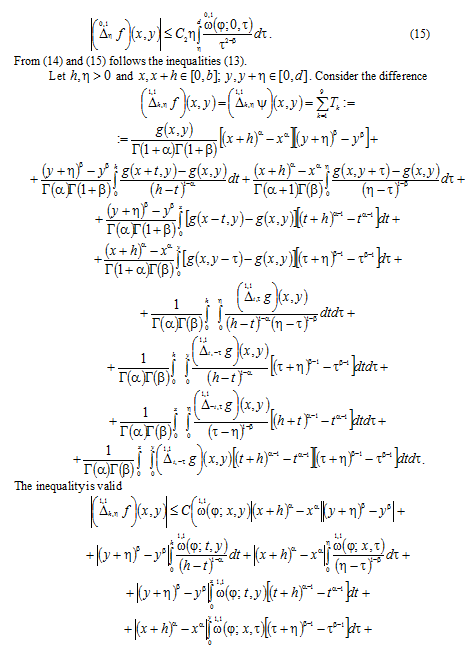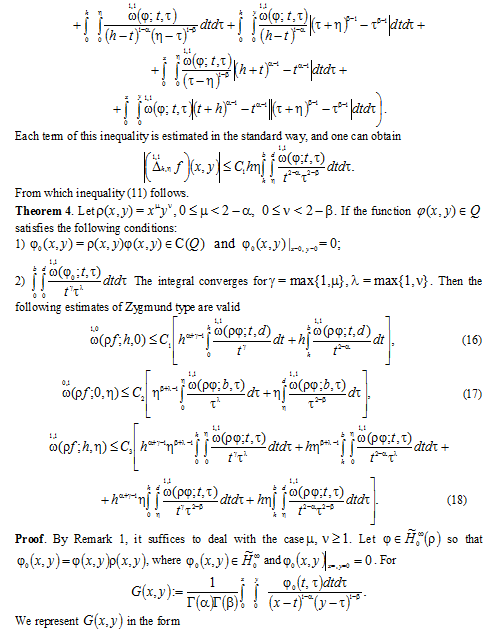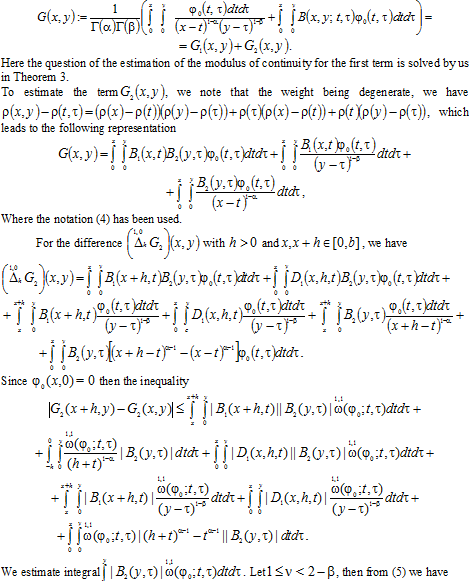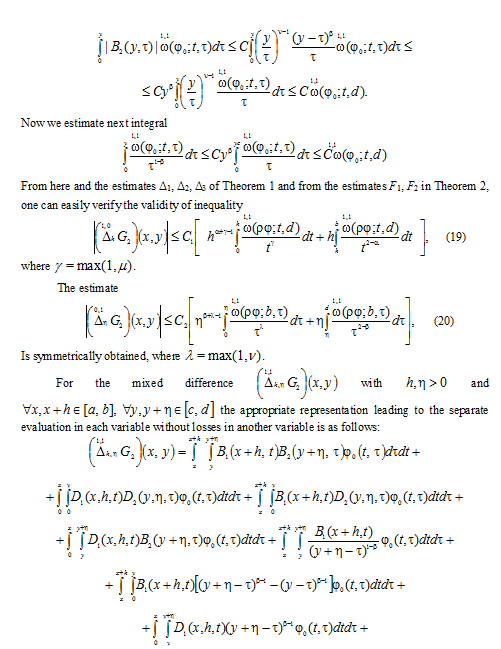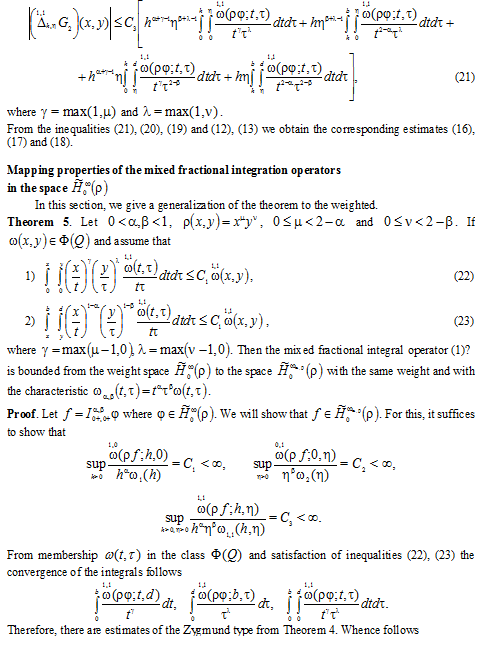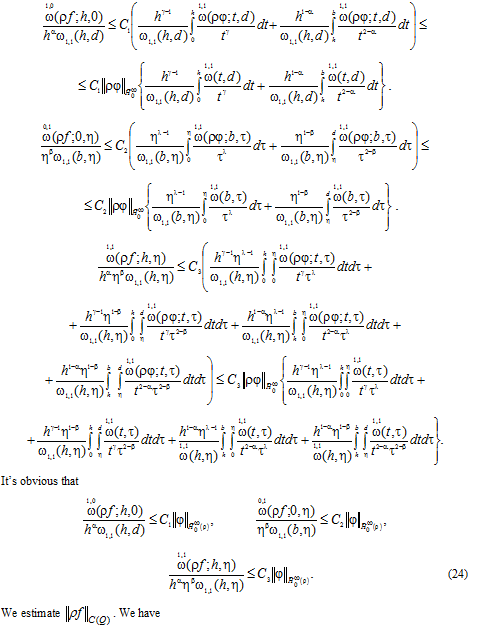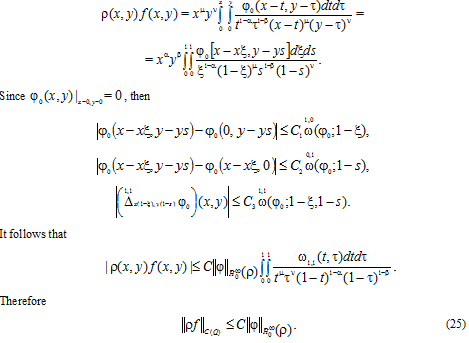AUCTORES
Globalize your Research
Research Article | DOI: https://doi.org/10.31579/2690-0440/001
*Corresponding Author: T.Mamatov, Department of Higher mathematics, Bukhara Technological Institute of Engineering, Bukhara, Uzbekistan
Citation: T. Mamatov (2020) Fractional Integration Operators in Mixed Weighted Generelized Hölder Spaces of Function of Two Variables Defined By Mixed Modulus of Continutity. J Mathematical Methods in Engineering. 1(1): DOI:10.31579/2690-0440/001
Copyright: © 2020 T. Mamatov. This is an open-access article distributed under the terms of the Creative Commons Attribution License, which permits unrestricted use, distribution, and reproduction in any medium, provided the original author and source are credited.
Received: 16 March 2020 | Accepted: 23 April 2020 | Published: 29 May 2020
Keywords: function of two variable; mixed fractional integral; mixed difference, generalized hölder space; weighted space;weight; mixed modulus of continuity
In the presented work for operators the mixed fractional integration character of improvement of smoothness in comparison with smoothness of density

with weight

in case of its any continuity modulus is found out

Zygmund type estimates are received. We consider operators of mixed fractional integration in weighted generalized Hölder spaces of a function of two variables defined by a mixed modulus of continuity.
One of the most important problems in the theory of integral operators in space is the problem of elucidating the dependence of the smoothness of the image on the smoothness of the preimage. The solution to such a problem plays an important role in the solvability of integral equations, their stability, and so on. The concept of smoothness can be formulated in a variety of terms. One of the ways of sufficiently fine-grabbing the smoothness of functions is the notion of generalized Hölderness, formulated in terms of the behavior of the modulus of continuity. Thus, one of the important questions in the theory of operators is as follows: Let be A an operator acting in a Banach space X and let be the modulus of continuity

of

X. How can the behavior of the modulus of continuity be characterized

if the behavior of the modulus of continuity of function

for all is known

where is

a given continuous function

This problem admits a natural generalization to the weight case namely, let

weight function and

for all

How to estimate the modulus of continuity

A similar problem can be considered completely solved for different spaces, and also for the Holder space of functions of one variable and power weights, when

([2] – [6], [13] – [19]). A detailed review of these and some other close results can be found in [12].
The assertion for multidimensional cases on the property of mapping in the usual Hölder and in the Hölder spaces defined by mixed differences are known [7], [8], [9], [10], [11], [12].
A similar problem in generalized Hölder spaces of the function of several variables has not been studied. This paper is aimed to fill in this gap. We deal with both non-weighted and weighted spaces.
An important stage in the study of fractional integro-differentiation of functions from generalized Hölder spaces (see [1] - [6], [13], [14], [18]) is obtaining estimates of Zygmund type; Estimate of the modulus of continuity of a fractional integral in terms of the modulus of continuity of the original function.
The main thrust of the work is to obtain an estimate of the Zygmund type that majorizes the mixed modulus

of continuity of a mixed fractional integral with the weight of integral constructions from the mixed modulus of continuity

of its density

with weight

These Zygmund-type estimates and action theorems directly affect the character of the improvement of the modulus of continuity by a mixed fractional integration

of order


where

It should be emphasized that the presence of weight significantly affects the nature of the Zygmund type evaluation. This was known in the case of Zygmund type estimates for fractional integrals of functions of one variable.
This paper is devoted to the study of certain properties of the mixed fractional integral (1) in weighed generalized Hölder spaces of a function of two variables defined by mixed modulus of continuity.
We consider the operator (1) in

2. Preliminary information and notations
When studying the properties of continuous functions of several variables, in particular, two variables, the following classes of functions arise:



Where

are the partial modulus of continuity of the first order, and

is mixed modulus of continuity of order (1, 1);


(Definition of classes

and

see below).
The following identity is valid

Definition 1. Let function

is a bounded on

The modulus of continuity of

is the expression

is defined for all

that satisfy the condition

Definition 2. A function

is called a modulus of continuity if it satisfies conditions

Definition 3. We denote by

the class of functions the class of functions

defined on

and satisfying conditions
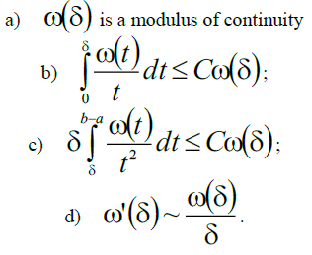
It follows from the definition

that this function belongs to

each of the variables. In addition, we note the inequality

Definition 4. We denote by

the class of functions of two variables

satisfying conditions:

We call this class the class of mixed modulus of continuity of the first order of continuous functions of two variables.
In [1] was shown that the properties 1) and 2) are characteristic for continuity modulus in the sense that for every

there exist such a function

that

Definition 5. Let us denote

the set of satisfying



Where C – is not envy from

Let

We have introduced a norm in

space

Where

Definition 6. We say that

if

and

We will also make use of the following weighted spaces. Let

be a non-negative function on Q (we will only deal with degenerate weights

Definition 7. By

we denote the space of functions

such that

respectively, equipped with the norm

By

we denote the corresponding subspaces of functions


such that

Below we follow some technical estimations suggested in [3] for the case of one-dimensional Riemann - Liouville fractional integrals. We denote

Where

In the case

we have

(4)
Where

Let also


Lemma 1. ([3]) Let

Then

(5)

(6)
Similar estimates hold for

and

with

Remark 1. All the weighted estimations of fractional integrals in the sequel are based on inequalities (5)-(4). Note that the right - hand sides of these inequalities have the exponent

, which means that in the proof it suffices to consider only the case

, evaluations of

, being the same as for

.
The following statements are known, begin first proved in (see also [17], p. 197). However, here we give a sketch of the proof of this lemma, in order to compose the representation of lightness for the two-dimensional case. Consider the one-dimensional fractional Riemann-Liouville integral

Theorem 1. Let

be continuous on

, and

. For the fractional integral (7), the estimate

Is valid.
Proof. Representing (7) as







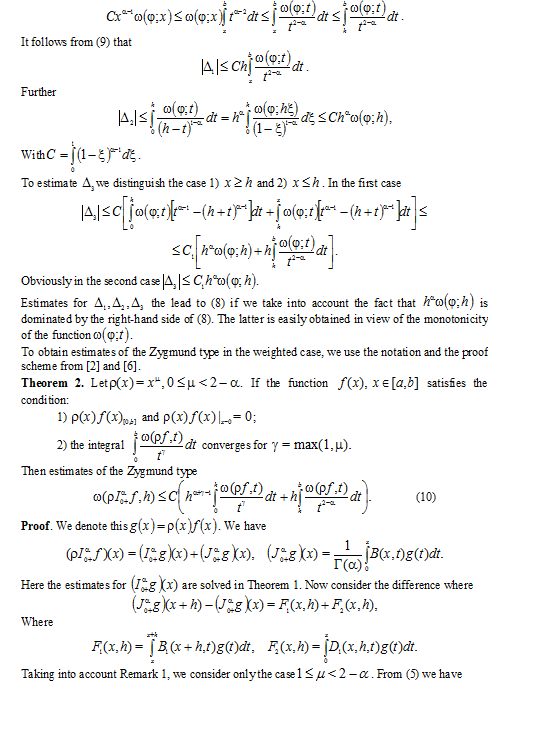
From the inequalities (24) and (25) follows the assertion of the theorem.



